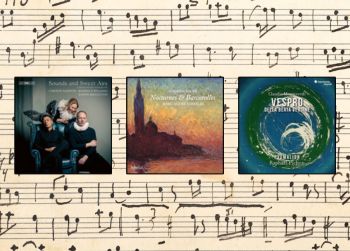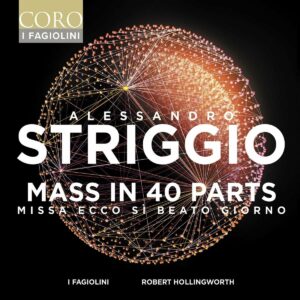At Wellington City Libraries we have the antidote to being aurally overwhelmed by a surfeit of Christmas carols: recent additions to our classical music collection include many wonderful new CDs in November and December, and this blog will explore some of these acquisitions. A special highlight is the Emerson String Quartet’s Infinite Voyage, the final recording by a venerable ensemble that disbanded in late 2023 after nearly half a century together. We also have Norman Meehan’s outstanding and much-needed biography of composer Jenny McLeod.
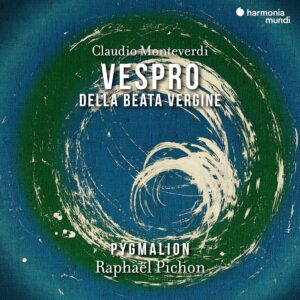 Vespro della Beata Virgine / Monteverdi, Claudio
Vespro della Beata Virgine / Monteverdi, Claudio
Raphaël Pichon founded the period-instrument ensemble Pygmalion in 2006, to explore the ‘filiations that link Bach to Mendelssohn, Schütz to Brahms or Rameau to Gluck and Berlioz.’ Since then, Pygmalion has demonstrated its ability to perform an enormous repertoire of music. The ensemble also holds a residency at the Opéra national de Bordeaux, and tours and records regularly. This recording of Claudio Monteverdi’s Vespers of 1610 opens with a veritable operatic explosion: the intonation ‘Deus, in adjutorium meum intende’ and the choral response ‘Domine, ad adiuvandum me festina’ suggest a lusty exhortation rather than a pious supplication. As the journey through Monteverdi’s Vespers continues, the overall mood remains operatic, but Pichon tempers bombast with moments of crystalline delicacy and tenderness. The instrumentalists and singers embrace their roles, expertly blending precision and expression to create a very memorable account of Monteverdi’s work.
Jenny McLeod : a Life in Music / Meehan, Norman
Norman Meehan’s biography of Jenny McLeod — one of the most extraordinary, innovative, and versatile talents in New Zealand music — is a welcome addition to our music and biography collection. As McLeod’s former student, Elizabeth Kerr, comments in her review, Meehan captures the enigmatic personality of his subject, drawing on many conversations, while also offering insightful and persuasive analyses of McLeod’s music, weaving together a narrative of her life with analyses of her music. Meehan’s depiction of McLeod is a compelling one, leading us on her journey: from Levin and Timaru to Wellington, then Paris and Olivier Messiaen, and Cologne and Pierre Boulez and Karlheinz Stockhausen, before McLeod’s return to New Zealand and a turbulent encounter with academe at Victoria University, arguably a milieu for which McLeod’s unique vision and prodigious musical intellect were both too great and too soon.
What emerges from A Life in Music is McLeod’s lifelong ‘search for meaning’ and fulfillment in her creative and spiritual life; her continuing quest for attaining these objectives could be intellectually and physically draining, but ultimately, as works like the opera Hōhepa, the score for Whale Rider, her song cycles setting New Zealand poets, the hymns and choral works, and of course, the Tone Clock pieces demonstrate, McLeod always surmounted these challenges. Meehan’s study of McLeod is, therefore, a readable, incisive, and sensitive account of one of New Zealand’s most remarkable musical lives.
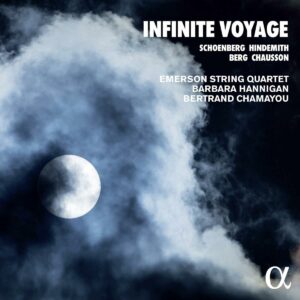 Infinite Voyage / Emerson String Quartet
Infinite Voyage / Emerson String Quartet
The Emerson String Quartet was formed when its members were still students at the Julliard School, and endured for more than four decades as one of the world’s great string quartets. After countless international tours and recordings, the Emerson Quartet decided to disband in 2023, and made their final performance on 22 October at the New York Chamber Music Society.
As David Allen wrote in his review for the New York Times, the Emerson Quartet was far more than a string quartet, ‘an establishment, a touchstone, a catalyst’ in the musical world. Although the repertoire choices in Infinite Voyage may appear disparate, this is all music that reflects the literal and figurative journies of the Emerson Quartet’s history. The music is ideally chosen to reflect the Quartet’s collaborations, ambitions, and friendships. Arnold Schoenberg’s Quartet No. 2 is a work that the Emerson Quartet had wanted to record since adding it to their repertoire, and in this recording they are joined by Barbara Hannigan. Hannigan also performs in Hindemith’s Melancholie, a song cycle setting four poems by Christian Morgenstern, and dedicated to Hindemith’s friend Karl Köhler who perished on the Western Front in 1918. Chanson perpétuelle by Chausson, here in its version for soprano, string quartet, and piano (Bertrand Chamayou), speaks of loss and separation, but also the comfort of memory. Berg’s String Quartet No. 3, completed in 1910 and premiered on 24 April 1911, is a work that still bristles with a sense of the avant-garde more than a century after its composition. The Emerson Quartet captures the audacious modernism of the work, as well as Berg’s immersion in and appreciation of lustrous late Romantic opulence.
Mass in 40 parts = Missa Ecco sì beato giorno / Striggio, Alessandro
Alessandro Striggio (c. 1536/7–1592) was a virtuoso performer on the lute, viol, lira da braccio and lirone, as well as an adept and imaginative composer, and his music dominated the Medici court in Florence during the 1560s. For many years he was best known for his secular vocal music, including many madrigals and some intermedi (precursors to opera). However, Striggio’s reputation changed with I Fagiolini‘s 2011 recording of his Mass in 40 Parts, an extraordinary large-scale sacred work. That recording won several awards including the Gramophone Early Music Award and a Diapason d’Or de l’Année. In this new album, the original recording of Striggio’s Mass has been remastered, and it is complemented by the addition of Thomas Tallis’s great 40-part work Spem in Alium. In a departure from convention, Hollingworth has added continuo instruments to Spem in Alium, adding remarkable depth and resonance to the piece, and providing a rich foundation for the towering edifice of Tallis’s motet.
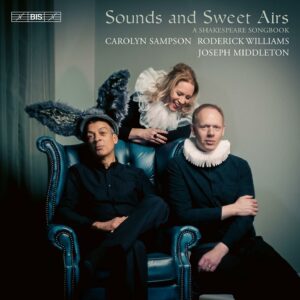 Sounds and Sweet Airs : a Shakespeare songbook
Sounds and Sweet Airs : a Shakespeare songbook
Carolyn Sampson (soprano), Roderick Williams (baritone), and Joseph Middleton (piano) collaborate here on an array of settings of Shakespeare’s texts. Their recording brings together such familiar songs as Schubert’s An Silvia (D. 106) and Haydn’s canzonetta She Never Told Her Love setting Viola’s words from Act 2 of Twelfth Night with newer responses to Shakespeare’s words, including Cheryl Frances-Hoad’s song cycle Rosalind, and Roderick Williams’s own Sigh No More, Ladies. The ingenious programming makes for diverting pairings of works: Michael Tippet’s Songs for Ariel alongside Arthur Honegger’s Deux chants d’Ariel, and Benjamin Britten’s Fancie next to Francis Poulenc’s Fancy (both setting the same text from The Merchant of Venice) demonstrate Shakespeare’s great reach across time and place. Representing the eighteenth century are J. C. Smith and Thomas Arne. The artists’ imaginative approach to this Shakespeare project makes for an illuminating song recital.
Choral Works / Cage, John
In 2022, BBC Music Magazine described performing this choral music by Cage as ‘the musical equivalent of climbing Mount Everest,’ and praised the Latvian Radio Choir for surmounting its ‘jagged, fragmented notes and pitches’ with accuracy and expression. Of particular interest is the work Hymns and Variations, in which Cage took two hymn melodies (‘Old North’ and ‘Heath’) by William Billings that form part of the New-England Psalm Singer (1770) and manipulated the tunes by altering the note values and durations and erasing some notes. In each of the variations Cage altered these manipulations, so that a mere revenant of Billings’s original melodies haunts the texture. The result is evocative and veiled, attributes strengthened by the excellence of the Latvian Radio Choir and the intuition of their director, Sigvards Kļava.
Nocturnes & Barcarolles / Fauré, Gabriel
Recorded in 2022, these nocturnes and barcarolles by Fauré add to the more than seventy albums Marc-André Hamelin has made for Hyperion, alongside chamber music by Franck, Dohnányi, Shostakovich, Brahms, and Schumann, solo sonatas by Mozart, Haydn, Liszt, CPE Bach, and Chopin, concertos by Alkan and Strauss, and shorter works by Debussy and Catoire, Bolcom and Feldman, among many others. In these Fauré pieces, Hamelin reveals his ‘innate affinity‘ with French music of the late nineteenth and early twentieth centuries; his performance of these works explores the subtle dramas of Fauré’s music. Hamelin’s complete command of the pieces’ harmonic intricacies is almost painterly, tiny brushstrokes and choices of colour that coalesce into a large and beautiful poetic canvas.


